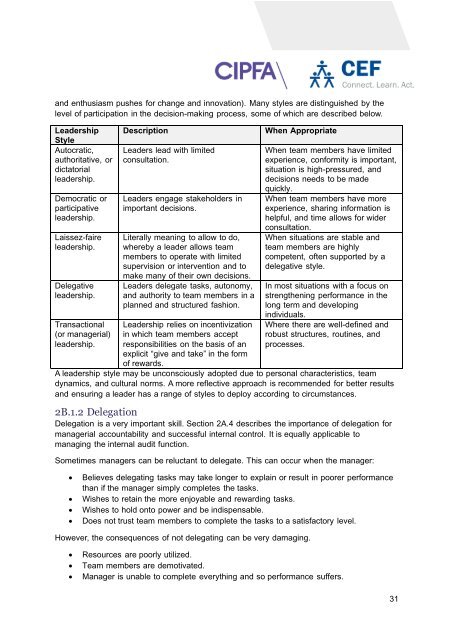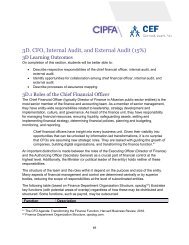TIAPS ALB_Module 2B. Managing People
- No tags were found...
You also want an ePaper? Increase the reach of your titles
YUMPU automatically turns print PDFs into web optimized ePapers that Google loves.
and enthusiasm pushes for change and innovation). Many styles are distinguished by the<br />
level of participation in the decision-making process, some of which are described below.<br />
Leadership<br />
Style<br />
Autocratic,<br />
authoritative, or<br />
dictatorial<br />
leadership.<br />
Democratic or<br />
participative<br />
leadership.<br />
Laissez-faire<br />
leadership.<br />
Delegative<br />
leadership.<br />
Transactional<br />
(or managerial)<br />
leadership.<br />
Description<br />
Leaders lead with limited<br />
consultation.<br />
Leaders engage stakeholders in<br />
important decisions.<br />
Literally meaning to allow to do,<br />
whereby a leader allows team<br />
members to operate with limited<br />
supervision or intervention and to<br />
make many of their own decisions.<br />
Leaders delegate tasks, autonomy,<br />
and authority to team members in a<br />
planned and structured fashion.<br />
Leadership relies on incentivization<br />
in which team members accept<br />
responsibilities on the basis of an<br />
explicit “give and take” in the form<br />
of rewards.<br />
When Appropriate<br />
When team members have limited<br />
experience, conformity is important,<br />
situation is high-pressured, and<br />
decisions needs to be made<br />
quickly.<br />
When team members have more<br />
experience, sharing information is<br />
helpful, and time allows for wider<br />
consultation.<br />
When situations are stable and<br />
team members are highly<br />
competent, often supported by a<br />
delegative style.<br />
In most situations with a focus on<br />
strengthening performance in the<br />
long term and developing<br />
individuals.<br />
Where there are well-defined and<br />
robust structures, routines, and<br />
processes.<br />
A leadership style may be unconsciously adopted due to personal characteristics, team<br />
dynamics, and cultural norms. A more reflective approach is recommended for better results<br />
and ensuring a leader has a range of styles to deploy according to circumstances.<br />
<strong>2B</strong>.1.2 Delegation<br />
Delegation is a very important skill. Section 2A.4 describes the importance of delegation for<br />
managerial accountability and successful internal control. It is equally applicable to<br />
managing the internal audit function.<br />
Sometimes managers can be reluctant to delegate. This can occur when the manager:<br />
• Believes delegating tasks may take longer to explain or result in poorer performance<br />
than if the manager simply completes the tasks.<br />
• Wishes to retain the more enjoyable and rewarding tasks.<br />
• Wishes to hold onto power and be indispensable.<br />
• Does not trust team members to complete the tasks to a satisfactory level.<br />
However, the consequences of not delegating can be very damaging.<br />
• Resources are poorly utilized.<br />
• Team members are demotivated.<br />
• Manager is unable to complete everything and so performance suffers.<br />
31
















